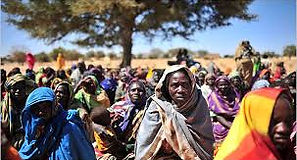Portafolio
MEMORY AND TOLERANCE MUSEUM
Genocides in the 20th century.
RWANDA 1994
On April 6, 1994, a plane carrying President Habyarimana, a Hutu, was shot down. Violence began almost immediately after that as Hutu extremists launched their plans to destroy the entire Tutsi population. Even if they were their friends or family, Tutsis had to be eliminated. The violation of Human rights was that people were not allowed to defend themselves.


BOSNIA 1992
(EX- YUGOSLAVIA)
In the Republic of Bosnia-Herzegovina, conflict between the three main ethnic groups, the Serbs, Croats, and Muslims, resulted in genocide committed by the Serbs against the Muslims in Bosnia. The violation was considered between the different nationalities that did not receive the right to choose their religion or cultural customs.

DARFUR-SUDAN 2003-PRESENT DAY
In 2003, two Darfuri rebel movements- the Sudan Liberation Army (SLA) and the Justice and Equality Movement (JEM)- stood up against the government, complaining about the marginalization of the land and the failure to protect sedentary people from attacks by nomads. The government of Sudan responded by unleashing Arab militarians known as Janjaweed, or “devils on horseback”.They attacked over 400 of villages throughout Darfur, and millions of civilians were forced to flee their homes. The violation suffered by people was that they were taken away from their own goods and possesions.


GUATEMALA 1981-1983
The dictator was overthrown, and reforms for the native people were created. The government created State ownership and America organised and trained a corps of eager Guatemalan exiles, then launched an invasion to bring down the government. The own government violated it's own rights by limitating the posseions of their people.


THE HOLOCAUST IN EUROPE 1939
Known as the biggest Genocide in humanity, and commanded by the German führer Adolf Hitler, to eliminate "impure races" such as homosexuals, gypsies, jews, and others( jews being the main target). 6 million of people were killed in concentration camps during the Second World War, and under the Nazi regimes. In general, Jews were the race that suffered the most and they suffered the greatest violation: the right to live.



LINKS:
http://www.unitedhumanrights.org/genocide/genocide_in_rwanda.htm
http://www.unitedhumanrights.org/genocide/genocide-in-sudan.htm
http://www.historyplace.com/worldhistory/genocide/bosnia.htm
http://www.ppu.org.uk/genocide/g_guatemala.html
http://www.history.com/topics/world-war-ii/the-holocaust
DEFINITION OF GENOCIDE
The definition of genocide was adapted and named after violent events in humanity, such as any massive extermination of a social race, gender, religion, or status. The roots of this word are in Latin which genus means linage and caedere means kill, giving a meaning that leads to the phrase: “killing of a race”.
In 1948, the United Nations gathered and formed an assembly to prevent genocides that led to the creation of a Convention and articles that punished this action.
In the history of humanity, there have been many events and situations to prevent genocides, but in reality, none of them have taken real action. By this I mean nobody has ever punished those who have discriminated or exterminated a specific social group. Between the most known genocides in history, as I mentioned, The Holocaust suffered from 4 to 6 million deaths of Jewish and non-Jewish people, and in the end nobody was blamed. Unfortunately the German führer Adolf Hitler committed suicide, maybe because all of the pressure on him, but in the end he was not able to receive a punishment. Same as the Guatemalan governor who was he that proclaimed the murder of the Indian people, his own nation, and his own race that he wanted exterminated.
Proving my point and according to the United Nations and the Declaration of Rights of Men, those who violate human rights should receive a sanction, but in my opinion killing or punishing for peace is a violation of human rights itself.
What humanity should do is start accepting and respecting differences between each other, we should all gather as brothers and sisters in peace. No more wars, no more killing, no more discrimination against races different than ours, and most importantly respect. A phrase by the Babylonian Talmud impacted me, ”him who saves a life is as if he has saved humanity”. We talk about genocides as an exaggeration, but we should take more time to consider and think about what it really means, and that it does not need to be massive to be recognized.
" A LIE REPEATED PROPERLY A THOUSAND TIMES BECOMES THE TRUTH" -JOSEPH GOEBBELS
